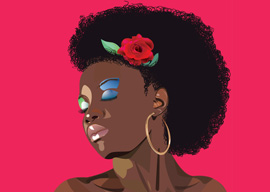
August 07, 2012

Who needs a Narnia-style wardrobe when you can drop into an alternate universe just by visiting the drugstore?
I simply stand in the hair-care aisle, facing an escarpment of shampoos, conditioners, gels, and sprays with brand names I”ve known since girlhood: Pantene, Garnier, Head & Shoulders, and”God help me”Herbal Essences.
Then I twirl 180 degrees and find myself in an exotic, if very tiny, foreign land.
I”m talking about the “black hair” shelf.
Something called “Queen Helene Cholesterol Hot Oil Treatment” sounds freaky enough, but what the hell is “Dr. Miracle’s “Feel It” Formula”? The scalp appears to be an area of particular concern. Making something called “shea” into butter turns out to be a primary industry.
For products purporting to increase one’s attractiveness, stuff for black hair often comes in plain, even hideous, packaging that makes it look more like long-defunct brands of car wax.
A shockingly large number of chemical hair relaxers boast”no pun apparently intended”of being “no-lye.” And some of these potions and pomades supposedly have, er, magical powers.
Black hair is in the news, what with African-American Olympics viewers reportedly more focused on gold medalist Gabby Douglas’s hair than her gymnastic prowess. Gabby’s hair, you see, is “natural,” not “kept.” She’s supposed to “represent” better. She desperately “needs some gel and a brush.”
(Were these the same folks who denounced NBC as “racist” for running a commercial with a gymnastic monkey right after the network announced Douglas’s win? Or the ones who demanded Don Imus’s scalp after he called the Rutgers women’s basketball team “nappy-headed hos“? God, let’s hope so.)
Thanks to the Gabby Douglas story, many non-blacks are learning for the first time that hair is to black women what weight is to white ones and that “a large number of black women don”t work out because of their beloved hairstyle.” It’s also a major reason why so many African-Americans never learn to swim (with fatal results).
Every few years, the subject percolates back up into the general public’s awareness. A little movie such as Barbershop posts breathtaking ticket sales and introduces whites to the central role these neighborhood hangouts have long played in African-American life.